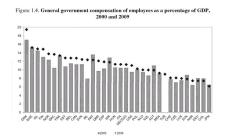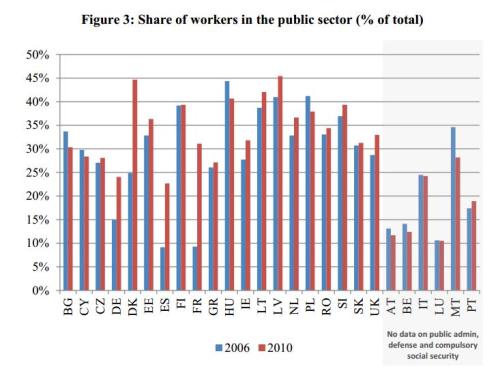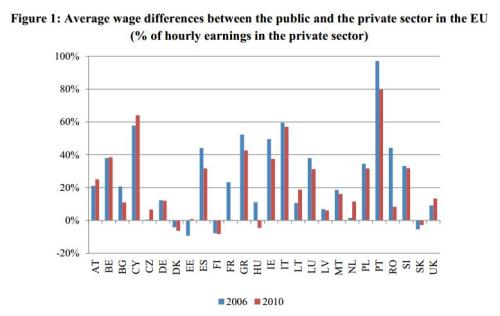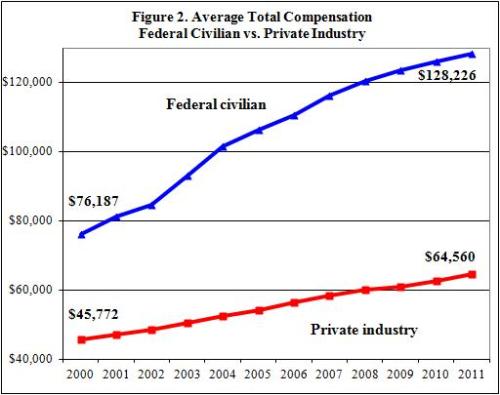The only sustainable way of achieving more prosperity and higher living standards is to increase the quality and quantity of labor and capital in the economy.
This may sound like boring econo-speak, but labor and capital are the two “factors of production” and our ability to consume is limited by what we can produce.
That’s one of the reasons why it’s important to reduce the burden of government spending.
People sometimes assume it’s important to reduce the budget to lower the threat of tax hikes. That is a good reason to impose fiscal discipline, but it’s presumably even more important to restrain spending because we don’t want labor and capital being misallocated by fiscal policy.
A big public sector, after all, presumably means a large bureaucracy. And when you have lots of people employed by government, that means that they’re not working in the private sector. In other words, they’re consuming economic output rather than adding to economic output.*
Or, as these cartoons illustrate, they’re riding in the wagon rather than pulling the wagon.
This is why advocates of economic growth should strive to limit the amount of bureaucrats and how much they’re paid. The bad news is that the public sector is far too large in the United States, and that means (as explained in this video) we have too many over-compensated bureaucrats.
 The good news, however, is that we’re not Denmark, which has the most expensive bureaucracy of all developed nations.
The good news, however, is that we’re not Denmark, which has the most expensive bureaucracy of all developed nations.
Recommended
But it’s important to look at what’s happening Europe because BIS, OECD, and IMF data all show that we are going to become a European-style welfare state if nothing is done to reform our poorly designed entitlement programs.
That’s why a new study from the European Commission is worth a look. The report measures both the size of the bureaucracy and the degree to which bureaucrats are over-paid.
Here’s a chart from the study that shows the share of the workforce that was diverted to bureaucracy in both 2006 and 2010. I’m not sure I fully trust the numbers (I doubt, for instance, that France tripled its bureaucracy in just four years), and there’s an absurdly large amount of missing data for nations on the right side of the chart, but we at least can get a rough idea that about one-third of all worker have been sucked into the public sector.
That’s certainly not very good news for economic output. And it explains in part why European tax burdens are so excessive.
But if you want to be further depressed, here’s another chart from the study showing the degree to which government bureaucrats are over-paid compared to workers with similar skills and experience in the private sector.
Looking at the data, there are some countries – such as Denmark, Finland, Estonia, and Slovakia – where bureaucrat pay is roughly comparable to private sector compensation.**
But there are other nations where bureaucrats are wildly over-compensated. And it’s no surprise that these are some of the nations that are facing fiscal crisis, including Cyprus, Spain, Italy, Greece, and Ireland.
And this is why Americans should pay close attention to this issue. My colleague at the Cato Institute, Chris Edwards, put together this chart showing that federal bureaucrats receive, on average, twice the compensation of workers in the productive sector of the economy.
These numbers aren’t adjusted for education and experience, so they’re not directly comparable to the second chart in this post, but the data certainly suggest that federal bureaucrats are doing very well and that we could save a lot of money by freezing pay and benefits until the gap begins to narrow.
But what worries me is that politicians in Washington will make things worse, not better. Heck, just think of all the new over-paid IRS agents we’ll have to pay for just because of Obamacare!
*Some types of government spending, for core “public goods” such as maintenance of rule of law, create conditions that enable private output, so this is not an argument for zero bureaucrats. Instead, the key point is that government should be relatively small and staffed by people who are not being over-paid.
**Pay levels are an important indicator, and it’s good that some nations don’t pay bureaucrats more than workers in the productive sector of the economy. But keep in mind that bureaucrats are – by definition – being paid too much if they are part of departments, agencies, and programs that shouldn’t exist. Which reinforces the point about limiting the size of government.
P.S. I’ve criticized the European Commission for statism and I’ve mocked the two lead bureaucrats of the EC, but I should acknowledge that the international bureaucracy deserves some credit for producing a report that highlights overpaid government bureaucrats. And it was just a couple of months ago that one of the European Commissioners criticized France for excessive taxation. Maybe, just maybe, reality is forcing Europe’s political elite to wake up.




























Join the conversation as a VIP Member